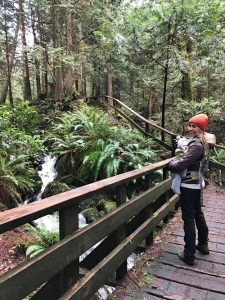
A Q&A with Anne Lasinsky
Anne Lasinsky, PhD student in the School of Kinesiology, focuses her research on the health of children and adolescents, seeking to create opportunities for kids to have happy, healthy, and active childhoods.
In the fall, Anne will join Dr. Eli Puterman, Associate Professor in the School of Kinesiology and Canada Research Chair Tier 2 in Physical Activity and Health, on the OMiCS Study.
What is the OMiCS Study?
OMiCS is the Optimizing Movement in Children Study. Our team knows that being active makes kids healthier, but we want to further understand how being active could change children’s health at the cellular level.
The study is designed to compare children’s behaviour (physical activity, physical competency, sleeping, and screen time) with their biological and health assessments. By doing this, our team hopes to understand more about the relationships between activity and health.
Why is the OMiCS Study important?
Our goal with the OMiCS study is to use a personalized medicine approach to better understand the health of kids across all levels of physical activity. It is now known that physical activity helps improve our health in many ways, including a lower risk of chronic disease and obesity, and improved self-esteem and mental health. Most children still struggle to get the important physical activity that they need to see these benefits, though.
Children who are physically active show improved musculoskeletal and cardiovascular health, and have a decreased risk of developing chronic conditions including type 2 diabetes and obesity.
Active children also show decreased incidences of anxiety and depression, as well as improved socioemotional development and self-esteem. All of these factors point to the abundance of benefits provided by physical activity, and serve as the motivation behind our study: why do children with increased levels of physical activity demonstrate these health benefits?
What is happening next in the OMiCS Study?
The Pilot phase of the study begins in early August, and we are actively seeking healthy 10-year-old children to participate. We ask families to visit three times here at UBC. The first day is an orientation day. The second day is when we’ll collect things like the child’s height and weight, as well as blood and hair samples. The third day is a science camp day, where kids will get to play games and learn about some of the science behind OMiCS. At the completion of the study, families will get a report about their physical activity, and the overall health of their child.
How can interested families get involved?
Interested families should visit www.omicskids.com to learn more about the study. The first visit for the upcoming pilot is set to launch on August 3rd. Children and parents will receive an honorarium.
Interested families should contact: ubckin.omicskids@ubc.ca